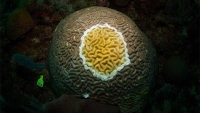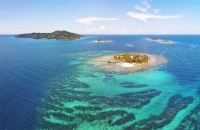Is scuba diving a safe activity?
Here are a few tips to dive carefully while safely enjoying marine life.
Scuba diving is a passion and for many a lifestyle. It is the best way to enjoy and admire marine life. All of us have spent nine months submerged in our mother's womb and after all, life started in the ocean. We all come from water, this must be a reason why we like scuba diving so much. But during evolution we have partially detached ourselves from our original habitat and scuba diving can be dangerous if not done conscientiously.
Enjoy our amazing underwater world in the safest and most comfortable way.

BEFORE DIVING
• First of all get certified. Scuba diving is an easy and safe activity but there are a few important things you must know to do it right and safely. There are plenty of dive operators everywhere in the world. Make sure you get the dive certification you need and do not trust your life to operators that allow you to dive without certification.
• You must have a medical check before starting, even if scuba diving is pretty much for everyone, there are few medical conditions that are not fit for underwater activities.
• Dive only with diving centers that are associated with recognized professional scuba diving associations. Choose the right diving center based on their reviews about professionality, experience and safety.
• Always check your gear yourself even if you have rented it, and do it very carefully. Make sure your tank is full and everything is working perfectly.
• Make sure you feel good and are ready to dive. You need to be 100% to dive, if you don't feel well or you have been drinking a lot the day before you should avoid diving. If you feel uncomfortable underwater, communicate it to your buddy and/or your dive guide and start your ascend asap but slowly.
• Be aware of sea conditions. Pay attention to the briefing and don't feel uncomfortable asking about current conditions or any other information concerning the dive that the dive master may have forgotten to give during the briefing.
• Make sure you and your buddy know all the underwater signals (especially the safety signals) in order to be able to easily communicate underwater. Remember you can't talk underwater. Be sure to do your buddy check before you enter the water
• It's a good idea to have travel insurance that covers diving activity as well.
ONCE IN THE WATER
• You will not dive alone but with a buddy or even with a larger group, but you must take full responsibility for your own safety. Make sure you dive responsibly and follow all the rules you have learned to avoid any potentially dangerous situations.
• Always descend and most of all ascend slowly. Nitrogen in a diver's body will expand quickly as he or she gets closer to the surface. You need to ascend slowly to allow nitrogen to exit your body safely and never forget the safety stop. Remember decompression sickness can cause serious health consequences.
• Scuba diving is not a solitary activity. You must always dive with a buddy. Never lose your buddy underwater and don't swim away from the group not even if you see something interesting. You could find yourself alone in a dangerous situation or ruin the dive for the other scuba divers, who will spend time looking for you.
• Equalize anyway. Don't wait for the pain to equalize your ear, do it frequently while descending.
• Breathe normally during the entire dive and never hold your breath. Remember the air in your lungs starts to expand during ascending due to the change of pressure and this may damage your lungs.
• Remember to dive within your safety limits, follow your computer and never go deeper than 130 ft (40mt) this will make your dive safe and you will be covered by your insurance if anything happens.
• Always keep an eye on your air gauge during the entire dive. You must always be aware of how much air you have in your tank and communicate it to your dive guide when he asks for it.
• Always bring a dive marker buoy. Most of the time boats don't see you on the surface. If you drift away with the current and you find yourself alone on the surface use your marker buoy before emerging and while waiting for the dive boat to come get you.
• Never touch anything underwater in order to protect yourself and the marine ecosystem. Many living organisms and fish can be seriously damaged if touched. On the other hand many living organisms can harm you with poison and some fish can also feel threatened and turn back to bite you, inflicting painful stings, or even delivering an electric shock.
• And finally don't fly in the 24 hours after the last dive. The excess nitrogen in your body could cause you problems



